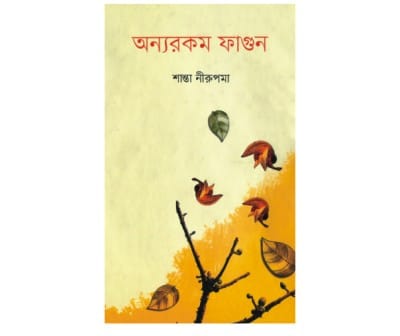Stories with moral undertones

Onnorokom Phagun, Shanta Nirupama, Brikkho
The Ekushey Book Fair, indeed, comes as a blessing for emerging new voices. When it comes to getting one's work published, young writers now have easier access to publishers, which is obviously a change for the better. Even a few decades ago when our leading authors had begun publishing, things were a lot different. Finding a publisher was not as easy. Now that gap between budding authors and publishers has largely been bridged thanks to the book fair. Many fresh new voices, who would otherwise have remained unknown, can get their works published now. Shanta Nirupama is one such new name who has stepped into the literary scene with her first short story collection published in the fair.
Onnorokom Phagun goes the title. Instantly, it reminds one of one of Zahir Raihan's fiction of nearly the same title. Nirupama's endeavour, however, has nothing in common with Raihan's classic. Hers, in fact, is an elementary approach to literature which evinces not so much of maturity as of unrefined emotions.
There are a total of eight stories in the book. Although they cannot go down the deeper crevices and layers of life, all of them in some way or other relate to real problems. Their heroes and heroines come from the educated middle class and are saddled with problems mostly marital or romantic. Only one of them is about a child who works as a house help. But most of the stories have a moral undertone which can hardly be overlooked.
'Bodhodoy' is about a moral lesson. An elderly man who always tends to find fault with others one day discovers that he himself is suffering from one of those diseases he has always made fun of. 'Morher Dokaner Doctor' also deals with an irony but the tone is again moral. A man who always undermines doctors' profession is saved by an ordinary doctor at the end of the story. The most serious moral, however, is imparted by 'Scaling' which as a Bengali word has a different meaning for students. Scaling is when you copy answers on the back of a wooden scale in exams. This is still a very common instance of unfair means adopted by our students. The tragic note on which the story ends tells us not to adopt unfair means in exams as well as in life.
The title story is about a neurotic husband who is suspicious of his wife. One story is about an arranged marriage; another is about an attractive divorced woman who is in her late twenties. Readers who are looking for some light stories to channel out their boredom may find it a good read.
The book, however, is marked by several flaws. Construction both in terms of narration and plot is very poor. Sentences are loosely connected and the language needs a lot more artistic input. The most important thing about fiction is creating a tension by manipulating the medium of language in a way that readers automatically will feel at one with the created characters. Above all, it is that tension which is missing in this book.
It is not that events in her stories do not culminate in tension. Instead, it is her presentation that fails to create the tension with efficiency. The author should do really well to read at first the works of our modern fiction writers such as Manik Bandyopadhyay, Syed Waliullah, Hasan Azizul Haque, Selina Hossain and Shawkat Ali; and try to understand the mastery of telling a story.

 For all latest news, follow The Daily Star's Google News channel.
For all latest news, follow The Daily Star's Google News channel. 



Comments